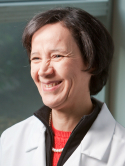The founder mutation MSH2*1906G→C is an important cause of hereditary nonpolyposis colorectal cancer in the Ashkenazi Jewish population Journal Article
| Authors: | Foulkes, W. D.; Thiffault, I.; Gruber, S. B.; Horwitz, M.; Hamel, N.; Lee, C.; Shia, J.; Markowitz, A.; Figer, A.; Friedman, E.; Farber, D.; Greenwood, C. M. T.; Bonner, J. D.; Nafa, K.; Walsh, T.; Marcus, V.; Tomsho, L.; Gebert, J.; Macrae, F. A.; Gaff, C. L.; Bressac-de Paillerets, B.; Gregersen, P. K.; Weitzel, J. N.; Gordon, P. H.; MacNamara, E.; King, M. C.; Hampel, H.; de la Chapelle, A.; Boyd, J.; Offit, K.; Rennert, G.; Chong, G.; Ellis, N. A. |
| Article Title: | The founder mutation MSH2*1906G→C is an important cause of hereditary nonpolyposis colorectal cancer in the Ashkenazi Jewish population |
| Abstract: | Hereditary nonpolyposis colorectal cancer (HNPCC) is caused by mutations in the mismatch-repair genes. We report here the identification and characterization of a founder mutation in MSH2 in the Ashkenazi Jewish population. We identified a nucleotide substitution, MSH2*1906G→C, which results in a substitution of proline for alanine at codon 636 in the MSH2 protein. This allele was identified in 15 unrelated Ashkenazi Jewish families with HNPCC, most of which meet the Amsterdam criteria. Genotype analysis of 18 polymorphic loci within and flanking MSH2 suggested a single origin for the mutation. All colorectal cancers tested showed microsatellite instability and absence of MSH2 protein, by immunohistochemical analysis. In an analysis of a population-based incident series of 686 Ashkenazi Jews from Israel who have colorectal cancer, we identified 3 (0.44%) mutation carriers. Persons with a family history of colorectal or endometrial cancer were more likely to carry the mutation than were those without such a family history (P = .042), and those with colorectal cancer who carried the mutation were, on average, younger than affected individuals who did not carry it (P = .033 ). The mutation was not detected in either 566 unaffected Ashkenazi Jews from Israel or 1,022 control individuals from New York. In hospital-based series, the 1906C allele was identified in 5/463 Ashkenazi Jews with colorectal cancer, in 2/197 with endometrial cancer, and in 0/83 with ovarian cancer. When families identified by family history and in case series are included, 25 apparently unrelated Ashkenazi Jewish families have been found to harbor this mutation. Although this pathogenic mutation is not frequent in the Ashkenazi Jewish population (accounting for 2%-3% of colorectal cancer in those whose age at diagnosis is <60 years), it is highly penetrant and accounts for approximately one-third of HNPCC in Ashkenazi Jewish families that fulfill the Amsterdam criteria. |
| Keywords: | immunohistochemistry; clinical article; controlled study; gene mutation; case control study; case-control studies; dna-binding proteins; mutation, missense; proto-oncogene proteins; protein conformation; neoplasms; colorectal cancer; dna repair; genetic predisposition to disease; gene frequency; haplotypes; heterozygote; chromosomes, human, pair 2; haplotype; pedigree; dna; mismatch repair; family history; israel; familial cancer; crystallography, x-ray; alanine; point mutation; founder effect; jews; ethnic group; polymorphism, genetic; colorectal neoplasms, hereditary nonpolyposis; muts homolog 2 protein; jew; microsatellite repeats; proline; pedigree analysis; humans; human; male; female; priority journal; article |
| Journal Title: | American Journal of Human Genetics |
| Volume: | 71 |
| Issue: | 6 |
| ISSN: | 0002-9297 |
| Publisher: | Cell Press |
| Date Published: | 2002-12-01 |
| Start Page: | 1395 |
| End Page: | 1412 |
| Language: | English |
| DOI: | 10.1086/345075 |
| PUBMED: | 12454801 |
| PROVIDER: | scopus |
| PMCID: | PMC420003 |
| DOI/URL: | |
| Notes: | Export Date: 14 November 2014 -- Source: Scopus |
Altmetric
Citation Impact
BMJ Impact Analytics
Related MSK Work








